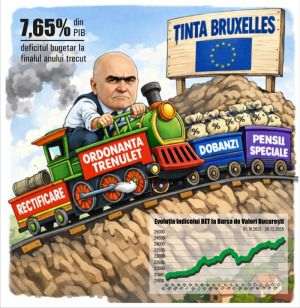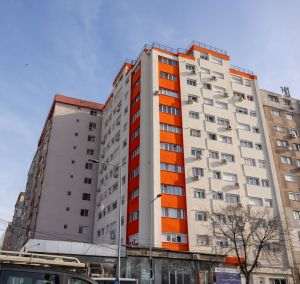Reporter: What effects do you think the cut of the Social Security Contributions will have in the economy and when it comes to the stability of the macroeconomic environment?
Lucian Croitoru: On principle, the cut of the social security contributions (CAS) is a good thing. The talks about cutting the social security contributions have begun since before 2000. There have been several successive cuts, but the process has been stopped a few years ago because no alternative resources have been found to cover the deficits in the budget. The recent cut of the social security contributions for companies would only be beneficial if it were sustainable. But if, after the presidential elections, there are going to be other taxes to compensate the losses in income which the cut of the social security involve, then we're back to square one. If salary taxes are increased to compensate for the revenues lost through the cut of the CAS, then it will be seen that it doesn't contribute to the economic growth nor to the creation of jobs.
Reporter: Do you think that the personal income tax will be increased by moving to a progressive taxation scheme?
Lucian Croitoru: Increasing salary taxes through a potential switch to a progressive taxation scheme will have two disappointing effects: it will not bring in additional revenues to the state budget and will also reduce aggregate demand. Regardless of the taxation scheme, revenues from the taxation of personal income have rarely exceeded 3% of the GDP slightly in the last 25 years. Furthermore, Romania has budget revenues of at most 33% of the GDP. Many people say that we should raise taxes to get to the levels of the developed countries, which have revenues ranging between 37 and 47% of the GDP. This is an ill-advised notion, especially now, when the output is less than what it could be. The correct solution would be to streamline expenses (in other words, eliminating pointless expenditures) and passing laws that are clear, cohesive and unbiased. That is when we are going to have increased revenue collection. But the low rate of tax collection isn't a true problem either. The real problem is that the state, which hasn't streamlined its expenses, has taken, through increased taxes or through a bigger number of taxes all the savings of companies, to continue its unrestructured spending. Companies have responded by migrating to the informal segment, where they don't pay taxes. Individuals will do the same, if income taxes increase. That is why it appears that the tax collection rate is low. What is worse, in my opinion, is the fact that the streamlining of expenses, which Romania seriously needs, is still not considered the viable fiscal policy option.
Reporter: And the effects on aggregate demand and workforce employment rate?
Lucian Croitoru: Higher salary taxes mean lower net salaries. This will lead to a drop in consumption. But there is also a "paradox of toil", of Gauti Eggertson: if (i) the interest rate is zero and (ii) output is below the potential, wage cuts lead to increased unemployment. We don't meet the second requirement, but the developed countries have reached that point. If those countries remain for a long time in that situation - which isn't out of the question, judging by Japan's experience - then it is possible that other economies will reach that stage. Inflation is already very low in many emerging countries, including in Romania, and it would be unwise to play with fire. Here is how the paradox works: many people will want to work even more, to compensate the drop in income. The increased workforce places pressure on reducing salaries in the future, which is reflected in the drop of the expected inflation. As a result, the real interest rate - the difference between the nominal interest rate and the expected inflation - increases, reducing the current aggregate demand, as the increase in the labor supply deviates the potential GDP above the stability level. The difference between the potential GDP and the current GDP is reducing inflation. If the interest rate is zero, the central bank can not reduce that difference. Now consider together the context described in the previous question, which is definitely real, and the one described in the question and you get the conclusion that the cut of the CAS is only good if other taxes aren't increased to compensate for it.
Reporter: How do you think the Romanian currency will move, given the domestic imbalances and the outside factors?
Lucian Croitoru: Up until now, the leu has had good fundamentals. Its relative stability came from the fiscal consolidation (which meant the reduction of an imbalance), from the relatively large and well managed forex reserves, from the reduction of Romania's need for foreign financing (the foreign current account of the private sector has had an average surplus of 1.6 percent between 2009-2013, and the short term foreign debt has decreased). The interest rate in Romania is higher than in the Eurozone, which means that owning lei is rewarding. As advisor to the governor of the NBR I do not make predictions about the evolution of the leu. I can however tell you that at "the core" of the currency is confidence. And if there is peace, you can only generate confidence through good policies. Policies that further deepen the imbalances, that weaken the financial discipline by favoring debtors over creditors, etc, are "forbidden". Unfortunately, the pressure to enact such policies has increased.
• "A banking union would have appeared in Europe even if the crisis hadn't occurred"
Reporter: Do you think that Romania is ready to join the European Banking Union? Can we handle the new banking model?
Lucian Croitoru: Every country needs preparation to join the European Banking Union. None of them is ready from the get go. The European Banking Union is a practical solution to some of the problems of the financial-banking system of the EU. A banking union would have appeared in Europe even if the crisis hadn't occurred. It would have been best if the banking union had been the result of a political union, which would have borne a fiscal, monetary and banking union. This would have generated a full democratic legitimacy for any of the aforementioned unions. This would have been the best solution. But the European political context has created the need for the banking union to appear before the political and fiscal one. It is a need created by life. It would have been a mistake for it not to be done and it would have been a mistake for us not to be in there. That is what we are getting ready for. We will be better prepared in time, because there will be a learning process for all the members of this union.
Reporter: How do you think that the depositors of Romanian banks will react in the event of the coming into effect of the "bail-in" procedure?
Lucian Croitoru: In Romania, the deposits of individuals or of small or medium enterprises are guaranteed up to 100,000 Euros per individual and per bank. The "bail-in" occurs in the case of people that have bigger deposits. In other words, the latter will be considered creditors of the bank and will be treated as such. It is natural. You can't guarantee very large amounts using public money. In Romania there are few people that own amounts that exceed the guaranteed level.
• "Demand for investments will remain low for a number of years from now on"
Reporter: What does the crisis in Ukraine mean for the Romanian financial system? There have been voices that claim that Romania will benefit from the exit of foreign capital from Russia. Have there been capital inflows?
Lucian Croitoru: There can be direct and indirect effects. The direct effects could come from the presence of Ukrainian banks in Romania, which is not applicable, or to greater exposure of the Romanian banks to Ukrainian customers, which, once again, is not the case. The situation is similar when it comes to Russia: we do not have banks with Russian owners nor do we have important exposure of the Romanian banks to Russia. On the other hand, there can be indirect effects. Some of the major Western banks present in Romania have significant exposure to the private sector in Ukraine. As for the "flight of foreign capital from Russia", I can say that the volume of capital inflows has increased episodically, including after the Ukraine episode. It is difficult to say whether these increases are exclusively the result of the events over there. It is rather possible to say that Romania has actually begun being considered a < safe haven > by foreign investors some time before, especially after the fiscal corrections made in July 2010, which had a major contribution to the stabilization of the public finances in Romania. There are also commercial aspects. Our total exports to Russia and Ukraine represent less than 5% of the total Romanian exports. A 10% drop in these exports would slow down economic growth by less than 0.2%. Thus, the exposures of the exporters to the two countries are low, and could not generate real problems for the banks. It is known that we import approximately 13.5% of the total natural gas consumption from Russia via Ukraine. The remainder of approximately 1.5% comes from different sources. The fact that 85% of the natural gas consumption is produced domestically is reassuring.
Reporter: How do you think we can solve the problem of the drop in Foreign Direct Investments in Romania, if they can't be replaced by a local contribution?
Lucian Croitoru: The solution depends on the factors that have caused the investments to drop. First of all, I want to emphasize the fact that the economic and financial integration of countries has increased heavily in the last three decades. Because of that, the profiles of the trajectories that the real interest rates, investments and saving follow on a global level influence their profiles in Romania. The global financial crisis has determined an abrupt drop of the demand for investments in the developed countries, but less steep for savings. The same has happened in Romania. The effects of the global financial crisis will persist for a few more years, which also means that the demand for investments will remain low for a number of years from now on. One of the factors that explains the drop in investments is their profitability, which has significantly decreased after the crisis. The combination between the drop in the demand for investments and their profitability explains the contraction of the Direct Foreign Investments. Instead of foreign investments we can have public investments. But as you noticed, when faced with the crisis, governments cut investments, not current expenses. That leaves European funds, but the creation of projects that attract that kind of funds has contracted. The economic growth in Romania depends on capital inflows. As long as they remain low, economic growth will continue to "crawl". In order to attract foreign investments we need to develop the road infrastructure. Equally important is having policies that ensure the predictability of the business sector and to ensure the advancement of the institutions of the market economy, in order to make them fully functional. They have to ensure two things: (i) the financial discipline of the economy and (ii) the clear permanent separation of the legislative, executive and judicial power.
Reporter: What are the threats to the economy, in the electoral campaign?
Lucian Croitoru: There are many threats in a country where accountability is low. The last 25 years have proved that you can promise anything and then forget about it, without those making the promise being penalized democratically. I've told you that the pressure has increased to enact policies that weaken the financial discipline of the economy. There are many proposals for such policies, some of which have even been passed. For example, not just any scheme regulating personal bankruptcy is acceptable from an economic point of view. Such a scheme should prevent its abuse by the debtor, moral hazard or the deterioration of the creditors' position. It has to be very clear when it comes to the terms that a person must meet in order to qualify for the protection provided by such a scheme. The law of corporate insolvencies shows the abuse that can occur because the law in question allows the owners of some companies to declare them insolvent, and not to repay their creditors, including taxes. In spite of all this, the law allows the same owner to create a new company afterwards. In doing so, companies are being bankrupted and shut down, without any consequences for those who do it. Another generic threat is the introduction of unsustainable tax breaks, which I have referred to when I reviewed the cut of the social security contributions. The unsustainable breaks tend to increase in number prior to elections. For instance, the conversion of loans denominated in Swiss francs to lei could be a good idea, but if the conversion using the historic exchange rate will be required by the law, then the economic consequences will be extremely severe. I also think the idea of creating a development bank financed using public money is mistaken. Such banks are assumed to be operating based on commercial criteria, but in actuality, they issue loans based on political criteria, especially in economies with a high level of corruption. I want to remind the fact that the corruption index published Heritage Foundation for Romania is 37.7, which indicates a rather serious situation. These banks/state agencies end up being recapitalized by the government forever, in other words by the taxpayers. Concerning what we were talking about earlier, this is not how institutions get perfected.
Reporter: Do you think that the stock market can truly become a financing alternative for the banking system? How long would it take?
Lucian Croitoru: Yes the stock market can grow. But considering how things work in Romania and the mentalities that exist... I would say it would take a long time. For now, the banking system represents approximately 94% of the financial system. The state should have more confidence in the capital market and help it more. It is a viable solution for institutional advancement. On the demand side, the privatizations of some major companies will lead to an increase in free-float. Again to stimulate demand, barriers to market entry should continue to be eliminated (simplifying the opening of trading accounts, improving the voting procedure etc). But there is also a need to stimulate demand. For the domestic component, the private pension funds (second pillar), which provide half of the domestic demand, should be supported by increasing the contribution from 4.5% to 6%. This program initiated many years ago was continued during the crisis and it should not be stopped.











































